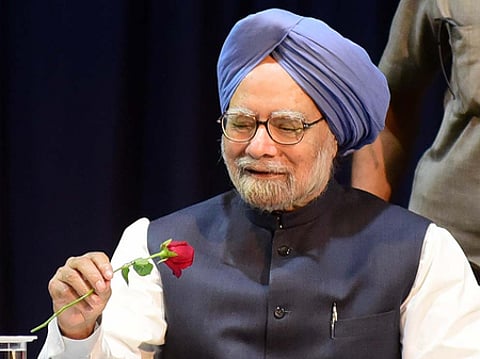

With the demise of Dr Manmohan Singh, India will be intellectually inferior, administratively deprived and politically poorer. In all the spheres that he dealt with Dr Singh was a performer par excellence. He was an academic, a bureaucrat and a politician. Above all a wonderful human being. In all the roles that he played, Dr Sigh has been able to accomplish so much that the record that he has set perhaps has no parallel in India.
An Outstanding Academic
Born on 26 September 1932 in Gah, West Punjab located in undivided India, Dr Singh’s family migrated to Haldwani at the time of partition in 1947 and later relocated to Amritsar 1948. An alumni of Punjab University, he took the Bachelors and Masters degrees in 1952 and 1954 respectively in Economics and then proceeded to Cambridge for the higher studies.
Returning from Cambridge in 1957, he served in his Alma mater till he went to Oxford for D Phil in 1960. At Oxford he undertook research under the guidance of IMD, Little. His thesis titled “India’s export performance, 1951-1960, Export Prospects and Policy Implications”, one of the pioneering work on India’ s exports and was later published by Oxford University Press. It may be a matter of interest today for those in agriculture and plantation to note that in 1950-51, plantation crops, mainly spices like black pepper and tea accounted for 21.8 percent of India’s exports.
After returning from Oxford, Dr. Singh joined Punjab University as a Reader in Economics, a position he held until 1966 when he joined UNCTAD. In 1969, he transitioned from UNCTAD to become a Professor of International Trade at the Delhi School of Economics, where he worked alongside prominent economists, including Professor K.N. Raj, until 1971. Dr Singh was then appointed as the Chief Economic Advisor in the Ministry of finance. In March 1991, when Dr Singh was appointed as the Chairman of the University Grants Commission (UGC), he was holding the highest academic position in the country that any academic could aspire for.
Bureaucrat Par Excellence
Recognising his expertise in India’s foreign trade and his exposure to multilateral organisations like UNCTAD, he was appointed as the Advisor to the Ministry of Foreign Trade. Subsequently, he held important positions like Chief Economic advisor in the Ministry of Finance, Secretary to the Finance Ministry and was appointed as the Governor of the Reserve Bank of India (RBI) in 1982. Following his stint at the Central bank, Dr Singh took over as Deputy Chairman of Planning Commission during 1985-87. During 1987-90 he held the position of the Secretary General of South commission, Geneva. On his return to India in 1990, he become Advisor to Prime Minister of India on Economic Affairs when Chandra Shekar was the Prime Minister of the country.
Politicians’ Pride
It was P.V. Narasimha Rao, then Prime Minister of India, who recognised the political potential of Dr. Manmohan Singh and appointed him as the Finance Minister at a time when the economy was in severe distress. Jairam Ramesh, who worked very closely with Narasimha Rao and Manmohan Singh, in his book “To the Brink and the Back” stated that in less than 35 days, the Rao-Singh duo ushered in momentous changes in economic policy that transformed the Indian economy. The reforms indeed were wide-ranging in the sphere of industry, trade, technology, FDI, finance among others. These reforms have had their impact in terms of turnaround in the external balance of the country on the one hand and the growth of the economy on the other.
During 2004-09 as the Prime Minister of India leading the United Progressive Alliance (UPA) government, Dr Singh was instrumental in the initiation of world’s largest anti-poverty programme called Mahatma Gandhi National Rural Employment Guarantee Act (MNREGA). Other initiatives included, but not limited to, Right to Education Act, Right to Information Act, National Rural Health Mission, Unique Identification Authority of India , leading to Aadhar. While most of these reforms were welfare oriented, Indian economy was also able to record the highest ever GDP growth rate in the range of 8-9%.
During the second term as Prime Minister, Dr Sigh recognised that while the economy has been recording unprecedented growth, the resultant prosperity has not been a shared one. Hence the focus was on locating varied spaces of exclusion and policy initiatives made to ensure that development is inclusive and none is left behind.
Dr Singh has often been commented for his humility and integrity. Perhaps none could believe that a man of such high stature used to drive Maruti 800. Needless to say, he had his full life with immense contribution and left behind much for his peers to emulate.
Promoting academic excellence
Dr Manmohan Singh was much concerned the state of higher education in the country. He rightly held the view that too many of our higher educational institutions are simply not up to the mark and an unprecedented growth in higher education could be happening without any commensurate improvement in quality. He never spared any opportunity to help the initiatives in promoting excellence in teaching and research in the country. His support for Punjab University, his role in establishing the Centre for Development Economics at Delhi University, the creation of the National Research Program on Plantation Development (NRPPD) at CDS at the request of Jairam Ramesh, and the establishment of the Gulati Institute of Finance and Taxation (GIFT) at the initiative of Dr. Thomas Isaac are just a few such examples.
Dr. Singh was often praised for his humility, which left a lasting impression on everyone who met him, as well as for his unwavering integrity and honesty. It is hard to believe that a man of such high stature drove a Maruti 800. Needless to say, he led a life full of immense contributions and left behind a legacy for his peers to emulate.
(The author, Dr K J Joseph, is Director, Gulati Institute of Finance and Taxation)